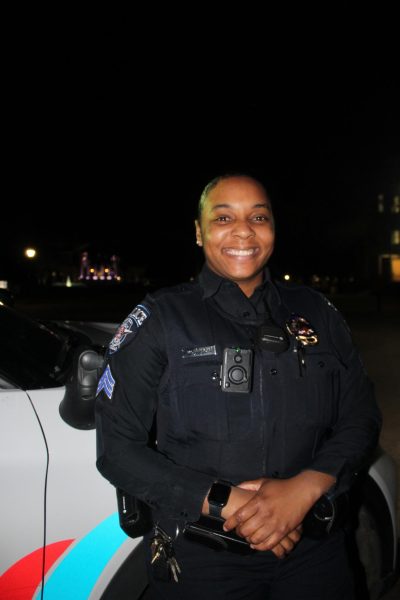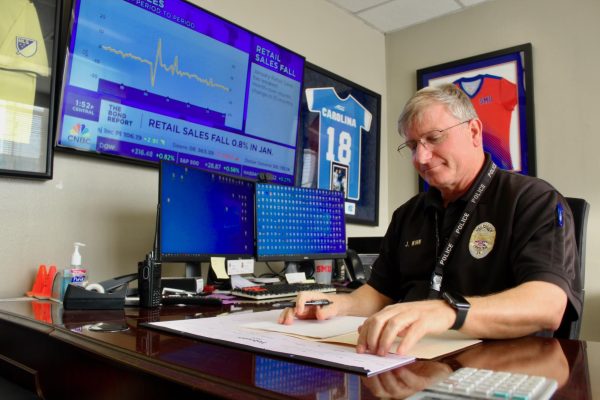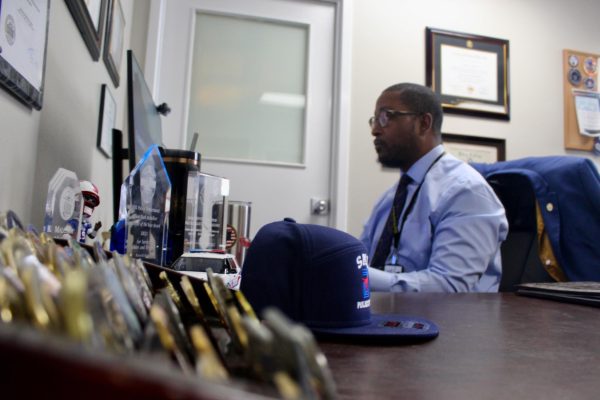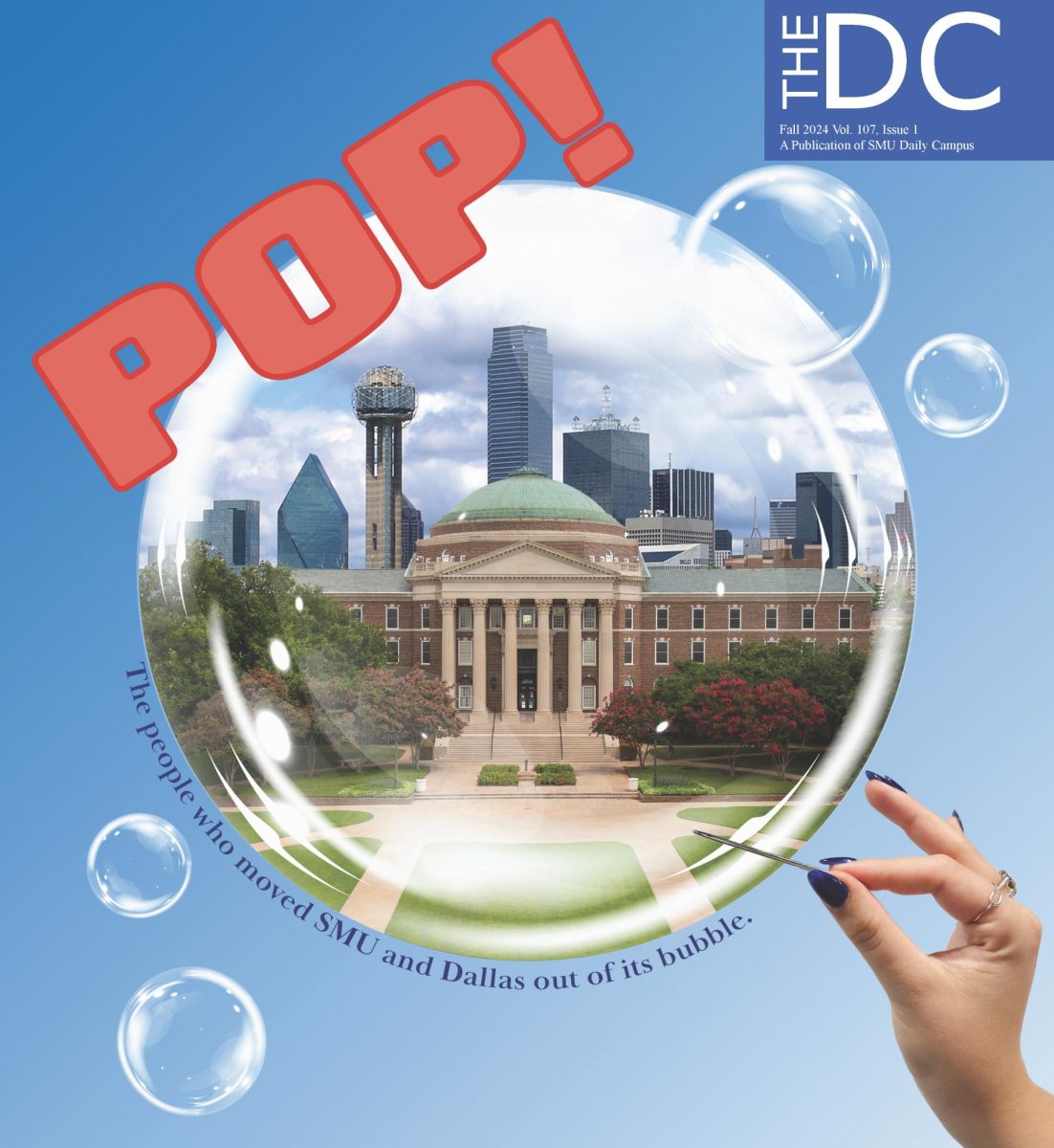Sergeant Courtney Morrison

“Don’t let the job consume you.”
That’s what SMU police Sgt. Courtney Morrison’s senior officers told her as a trainee in the police academy in 2015.
Morrison remembers that constantly.
“They would always say to make sure you had a life off-duty,” Morrison said. “If you’re sleeping, thinking and dreaming about this horrible call… you kind of have to let it go and be ready for the next one.”
Morrison currently serves as a crime victim liaison, where she deals with issues such as family violence and sexual assault. Morrison is also a community engagement officer at SMU. She previously worked as the sorority liaison officer, speaking at chapter meetings and holding self-defense classes, which she still does at Dedman Recreation Center.
Campus and pedestrian safety is one of Morrison’s top priorities. Her drive to keep students safe comes from incidents she witnessed on duty in Arlington, where she began her career at 21. Morrison recalled a car accident when a driver ran through a stop sign and killed a child. Taking her badge off at the end of that day was hard, she said.
“I took it upon myself to sit at the stop sign,” Morrison said. “I watched the stop sign because I was out there when they told the mother that her child had been run over.”
Many cases stick with her, Morrison said. However, she stressed there are positive outcomes that come from bad situations. For example, Morrison began patrolling that stop sign, which was an automatic deterrent for cars and the kids playing in the area felt safer. Morrison said safety is the main reason she became an officer.
“I knew I enjoyed making sure that people were safe,” Morrison said. “I didn’t want bad things to happen. And however I could prevent bad things from happening, that’s what I wanted to do with my life.”
Morrison is in her 10th year in law enforcement. She made the switch from Arlington to SMU in 2021. Here, she found her home.
Captain Jimmy Winn

Jimmy Winn has been in law enforcement at SMU since 2001. He took on the role of SMU police captain five years ago. Winn is a father of three and two of his children have attended SMU.
Good police officers are compassionate, honest and ethical, Winn said. Overseeing the officers is one of the most rewarding parts of his job, he added.
“I’m the type of person that I’ll take off my shirt to help somebody, and I think that is a main quality for officers,” Winn said. “Officers will need to have that mindset in order to respond to situations where they may have to put themselves in harm’s way for someone.”
Winn sees these qualities in all of the officers at SMU.
“The best part of [this job] is seeing the fruits of the officers’ labor with regards to how they’re out there interacting with the community and making a difference,” Winn said.
Winn encourages students to see the police in a different light and think of them as resources, rather than enforcement.
“There’s a misconception of what police officers do on TV,” Winn said. “It’s not how police really work.”
Oftentimes, portrayals on television about police only show them dealing with serious crimes, but there’s always more to the story, Winn said.
“When you look at it from the police side, [serious crime] is daily for us. We have to deal with that day in and day out,” he said.
Underneath the badge is a person driven with compassion, Winn said.
“We’re human, we bleed red, we breathe air, just like everyone else,” Winn said.
Investigator Malcom McGuire

Malcom McGuire has been in law enforcement for 21 years. It runs in the family. His five older brothers also went into law enforcement. At SMU, he first joined as a police officer, then was promoted to sergeant and is now an investigator.
“A lot of the campus alerts you see about suspicious people … comes from my office,” McGuire said. “Those are things that we investigate and we handle. When you get an alert and then another alert layer saying it’s been handled…that’s a win for us.”
McGuire also works to change the misconceptions some students, especially black students, might have of police officers.
“It’s a very real fear, it’s very warranted,” he said. “We see examples every day of how people of color are treated differently. ‘I’m still, for all intents and purposes, viewed as the enemy because what they’re looking at is the uniform and not me, so sometimes it just doesn’t matter what I say, but we’ll never stop working towards changing that perspective.”
Academic prosperity is at the heart of what SMU police tries to encourage and seeing them succeed is a rewarding feeling, McGuire said. He’s also an example having graduated with a master’s degree in dispute resolution from SMU 2014.
Coming from a law enforcement family, McGuire witnessed the family created within police departments his brothers worked. While city policing and campus policing are very different, McGuire said he saw firsthand a family at SMU’s police department.
On McGuire’s second day of work at SMU, his father passed away. The police chief at that time, Rick Shafer, and then Sergeant Rodney Irvin both attended the funeral.
“I’ve worked here for two days, I didn’t have a full uniform yet, and they came to the funeral. It’s made me want to emulate that in the way that I go about things with people who have worked for me and worked around me.”
Ride Along
It was a quiet Tuesday evening at 7 p.m. I signed a liability waiver and Sgt. Morrison met me in Patterson Hall. To my surprise, I sat in the front seat. I have never been in a police car before, so I had this notion I would sit in the back like the movies.
We drove around campus in circles, waiting for something to happen. There were no arrests, calls or chases. A black SUV cut us off, and Morrison flashed her lights to warn them. It was dark, Morrison said, they probably didn’t realize it was a cop car. Another car tried to run a stop sign as students were about to cross. Morrison honked the car horn.
As Morrison continued driving, we cut across the curb on Dallas Hall Lawn. We drove past the flagpole, past Hughes-Trigg and into the parking lot outside Patterson Hall.
“This is a very safe campus. There’s not much going on,” Morrison said.
If you want to take a ride-along, you can reach out to an officer or contact SMU police by email.
In the gray
In city police departments, the law is generally black and white. On SMU’s campus, officers have discretion over some infractions.
It’s a model that is meant to help students rather than punish them.
“At SMU, you can refer [students] to the SMU Student Affairs Conduct Office,” Morrison said. “If it’s something like a sexual assault or family violence, you’re going to go to jail. But for some things, we have the discretion to handle it in house and not necessarily involve the criminal justice system.”
SMU does not have a detention facility so police must transfer anyone being held to the Highland Park police department.
One situation might be a student who was drinking underage, but had personal or family issues, Winn said. Here, Winn said enforcing the law wouldn’t be the best way to help a student.
Morrison also said students often fear repercussions from the Conduct Office more than they fear a ticket from police.
Ultimately, discretion is subjective and depends on the situation.
The ultimate goal is to get students to graduation, McGuire said.
“We’re not here to keep people from matriculating. We’re here to make sure they do it in the safest way possible,” McGuire said.















